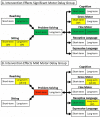START-Play Physical Therapy Intervention Impacts Motor and Cognitive Outcomes in Infants With Neuromotor Disorders: A Multisite Randomized Clinical Trial
- PMID: 33382406
- PMCID: PMC7910024
- DOI: 10.1093/ptj/pzaa232
START-Play Physical Therapy Intervention Impacts Motor and Cognitive Outcomes in Infants With Neuromotor Disorders: A Multisite Randomized Clinical Trial
Abstract
Objective: Our objective was to evaluate the efficacy of the Sitting Together and Reaching to Play (START-Play) intervention in young infants with neuromotor disorders.
Method: This randomized controlled trial compared usual care early intervention (UC-EI) with START-Play plus UC-EI. Analyses included 112 infants with motor delay (55 UC-EI, 57 START-Play) recruited at 7 to 16 months of age across 5 sites. START-Play included twice-weekly home visits with the infant and caregiver for 12 weeks provided by physical therapists trained in the START-Play intervention; UC-EI was not disrupted. Outcome measures were the Bayley Scales of Infant and Toddler Development, Third Edition (Bayley); the Gross Motor Function Measure; reaching frequency; and the Assessment of Problem Solving in Play (APSP). Comparisons for the full group as well as separate comparisons for infants with mild motor delay and infants with significant motor delay were conducted. Piecewise linear mixed modeling estimated short- and long-term effects.
Results: For infants with significant motor delay, positive effects of START-Play were observed at 3 months for Bayley cognition, Bayley fine motor, and APSP and at 12 months for Bayley fine motor and reaching frequency outcomes. For infants with mild motor delay, positive effects of START-Play for the Bayley receptive communication outcome were found. For the UC-EI group, the only difference between groups was a positive effect for the APSP outcome, observed at 3 months.
Conclusion: START-Play may advance reaching, problem solving, cognitive, and fine motor skills for young infants with significant motor delay over UC-EI in the short term. START-Play in addition to UC-EI may not improve motor/cognitive outcomes for infants with milder motor delays over and above usual care.
Impact: Concepts of embodied cognition, applied to early intervention in the START-Play intervention, may serve to advance cognition and motor skills in young infants with significant motor delays over usual care early intervention.
Lay summary: If you have a young infant with significant delays in motor skills, your physical therapist can work with you to develop play opportunities to enhance your child's problem solving, such as that used in the START-Play intervention, in addition to usual care to help your child advance cognitive and motor skills.
Trial registration: ClinicalTrials.gov NCT02593825.
Keywords: Early Intervention; Embodied Cognition; Infant; Motor Development; Neuromotor Delays; Problem-Solving; Reaching.
© The Author(s) 2020. Published by Oxford University Press on behalf of the American Physical Therapy Association.
Figures



References
-
- Harbourne RT, Dusing SC, Lobo MA, et al. Sitting Together and Reaching to Play (START-play): protocol for a multisite randomized controlled efficacy trial on intervention for infants with neuromotor disorders. Phys Ther. 2018;98:494–502. - PubMed
-
- Lobo MA, Galloway JC. Enhanced handling and positioning in early infancy advances development throughout the first year. Infant Devel. 2012;83:1290–1302. - PubMed
-
- Needham A, Libertus K. Embodiment in early development. Wiley Interdiscip Rev Cogn Sci. 2011;2:117–123. - PubMed

